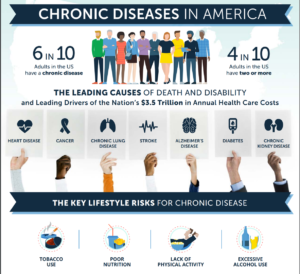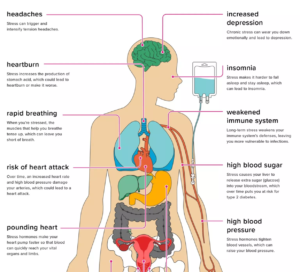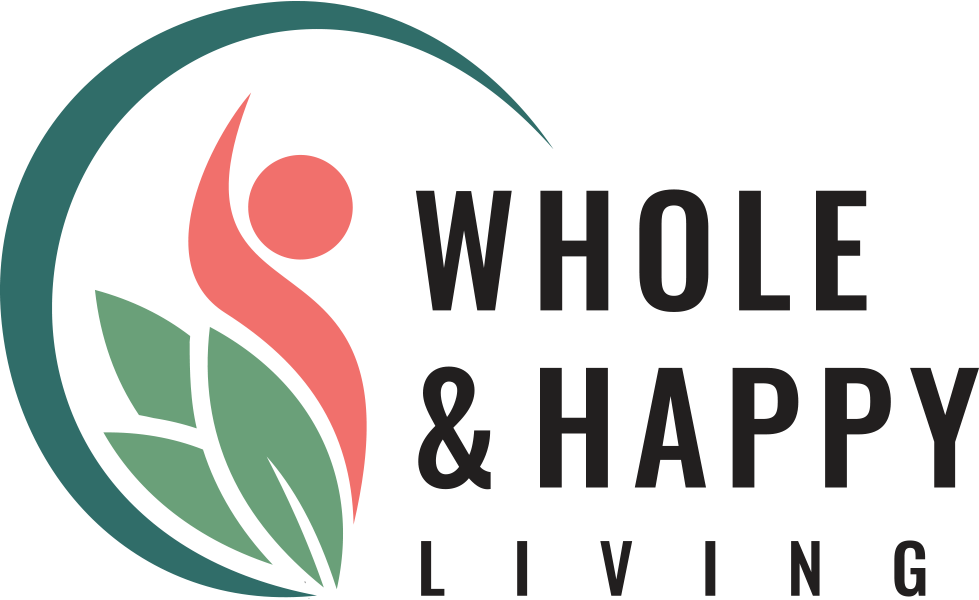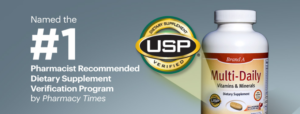All my life I have been very active and adventurous with sports, dancing, traveling and the list goes on. A few years ago over a period of about two months I became so sick with an auto-immune disease that my quality of life was turned upside down. I had to give up literally everything I loved doing. Over the last couple years of dealing with a chronic illness, I have come to accept that my life will never be the same. Chronic illness comes in many shapes and sizes, but the bottom line is, you don’t want one if you can avoid it.
You might be as shocked as I was to learn about the prevalence of chronic illness in the U.S. According to the CDC, 6 in 10 adults in the U.S. have a chronic disease and 4 in 10 adults in the U.S. have two or more chronic diseases!

The CDC also provides a list of the key lifestyle risks for developing a chronic disease:
- Tobacco Use
- Poor nutrition
- Lack of physical activity
- Excessive alcohol use
These lifestyle risks and many more are all too prevalent in our society today. The odds of remaining illness free are certainly against us. I don’t think you would be shocked if I pointed out that these key lifestyle risks are often how we tend to respond to excessive stress in our lives. Not all stress is bad. It is beneficial for our body to be able to go into “fight or flight” mode to help us function through stressful situations. The problem comes when we keep our bodies consistently in this mode. When we stay in a state of chronic stress, our body consistently releases the stress hormone

cortisol and not only makes us crave unhealthy habits to compensate and keep us going, but it also can lead to many health problems, some of which are illustrated in this image on the right from Healthline. It’s easy to get stuck in some of these habits and only become aware of the consequences once it’s too late.
Wellness coaching is a rapidly growing profession to help people create healthy lifestyles and avoid unseen pitfalls leading to many of these health risks in the future.
So what exactly is coaching and how can it benefit you?
Coaching is different than therapy or going to the doctor in that these types of professions take the roll of an expert. They are trained to figure out what is wrong and provide some sort solution to the problem. In coaching, however, the coach takes the opposite role valuing you as the client to be the expert of your own life.
The beauty and power of coaching comes from within you. By using a variety of skills and techniques, coaching enables you to recognize your own strengths and values. A coach helps you discover what is truly important to you and what motivates you. They help you to envision your ideal best self and figure out what works for you to slowly bridge the gap between where you are now and where you want to be.
Take Jill for example. Jill comes in to meet with a coach. The coach asks Jill what she wants to work on and she explains that she has a sugar tooth and really wants to cut down on the amount of sugar she is eating.
Instead of telling Jill what she needs to do, a coach would ask many questions to get to know her and what her everyday life looks like. They would draw out her strengths and her values and hand them back to her to use as tools to help her develop strategies that will set her up for success.
In Jill’s actual story as I met with her we started discussing sugar intake but we then discovered that the reason she is craving sugar is because she is so stressed. After discussing the aspects of her life that were most stressful and evaluating which of these areas was most important to her, she had this “ah ha” moment that what she really needed and wanted to do was to work on her relationship with her husband. Often times the thing you think you want to change is just the tip of the ice berg. Only you can discover those things in your own life and a coach has the unique skill set to help you find them.
Over the course of the last few years of my life as I have learned to live with an incredible amount of physical limitation, I would often think of the quote from Thornton Wilder’s Play, Our Town. “Do human beings ever realize life while they live it…every, every minute?” Sometimes we don’t realize what we have until it slips through our fingers. Collaborating with a coach will help you get your life to a point where you can really live and enjoy those precious moments life presents to you.
You don’t have to have health problems or want to lose weight in order to meet with a wellness coach. Wellness encompasses nearly every aspect of your well being. If you ever find yourself wanting things in your life to be different but can’t seem to find a way to get there, coaching may be your ticket to success. If you already have a chronic illness the coaching approach is slightly different in that we try to simplify things in your life that are a burden so you can use the limited energy you have on the things that are most important to you.
As a medical professional and a certified wellness coach, I would strongly urge you to put in the effort to invest in your health and wellness today so you don’t have to look back on your life and wonder what if? “What if I had invested in my health then…? What would my life look like now?”
It’s never to late to create and live a whole and happy life regardless of your circumstances. I offer free consultation phone calls to help you determine if coaching is a good fit for you. If you’re interested in giving coaching a try or want to learn more, please reach out to me! wprude@mywholeandhappylife.com
“Often times the thing you think you want to change is just the tip of the ice berg. Only you can discover those things in your own life and a coach has the unique skill set to help you find them.”

 supplements it’s hard to know what the right thing to do is. Do you take them? Could they really make an impact on your health? Are they actually safe or are there things to be cautious about?
supplements it’s hard to know what the right thing to do is. Do you take them? Could they really make an impact on your health? Are they actually safe or are there things to be cautious about?


